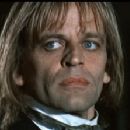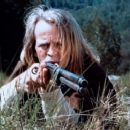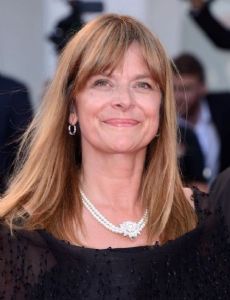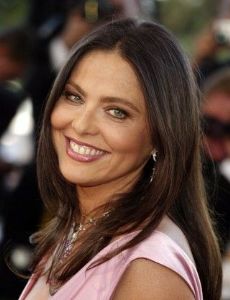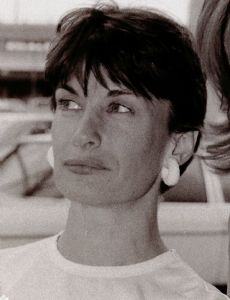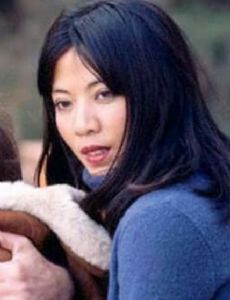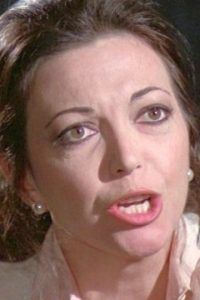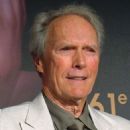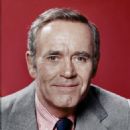Klaus Kinski Actor - Born October 18, 1926 in Zoppot, Free City of Danzig [now Sopot, Pomorskie, Poland]
Died November 23, 1991 in Lagunitas, California, USA (heart attack)
Birth Name Klaus Günter Karl Nakszynski
Height 5' 8" (1.73 m)
Mini Bio (1) Klaus Kinski was born as Klaus Günter Karl Nakszynski in Zoppot, Free City of Danzig (now Sopot, Poland), to Susanne (Lutze), a nurse, and Bruno Nakszynski, a pharmacist. He grew up in Berlin, was drafted into the German army in 1944 and captured by British forces in Holland. After the war he began acting on the stage, quickly gaining a reputation for a ferocious talent and an equally ferocious temper. He started acting in films shortly afterward, showing an utter disregard for the quality of the productions he appeared in and churning out so many that a complete filmography is almost impossible to assemble.
However, he did turn out memorable work for director Werner Herzog, a similarly driven and obsessive character. Herzog and Kinski pushed each other to extremes over a 15-year working relationship, which finally ended after filming Cobra Verde (1987), a production plagued by volcanic clashes between the star and director, involving--among other things--violent physical altercations and mutual death threats. He subsequently directed and starred in the notorious Paganini (1989), his only film as director and which was marked by (again) clashes between Kinski and his producers, who accused him of turning their movie into a pornographic film and sued him in court. His autobiography, "All I Need is Love", a vicious attack on the film industry, was withdrawn for legal reasons and subsequently re-released as "Kinski Uncut" in the US & UK, "Ich brauche Liebe" in Germany, and in various other languages.
- IMDb Mini Biography By: Michael Brooke
Family
edit
Spouse
editDebora Caprioglio (1987 - 1989)
Minhoi Loanic (1971 - February 1979) (divorced) (1 child)
Brigitte Ruth Tocki (30 October 1960 - 1971) (divorced) (1 child)
Gislinde Kühbeck (11 June 1952 - 1955) (divorced) (1 child)
Children
editNastassja Kinski
Nikolai Kinski
Parents
editBruno Nakszynski
Susanne Lutze
Trade Mark
editHis ability to tap on and portay a deep well of perversity
Almost always played crazed characters
Contorting, maniacal face
Was infamous for his violent temper
Often worked with director Werner Herzog
Gravelled, smoke-burnished voice
During interviews he would appear evasive and reserved until something triggered his infamous temper
Trivia (32)
editFather, with Ruth Tocki, of actress Nastassja Kinski.
Father of actress Pola Kinski.
Father of actor Nikolai Kinski.
His autobiography was originally released under the title "All I Need Is Love", but was withdrawn in 1989 due to a contract dispute: a German publisher claimed Kinski had previously released an autobiography for them entitled "Ich, Kinski", and sued the publishers. It was reissued in 1997 under the title "Kinski Uncut", adding material that had been excluded from the first version of the book.
For a brief time he lived in an apartment in Munich (Elisabethstraße 3) which he shared with several other people. One of the children living there was thirteen-year-old Werner Herzog. They later collaborated on five movies.
Grandchildren: Aljosha, Sonja and Kenya.
His countenance and screen persona gave his film career a boost in the 1960s when he was cast in a number of German productions based upon the thrillers of Edgar Wallace.
Uncle of actress Lara Lamberti.
Son of Bruno Nakszynski, a Polish-German pharmacist, and his wife Susanne Lutze, daughter of a German pastor from Danzig.
Of his three children, only his son Nikolai Kinski attended the funeral in California, where his ashes were strewn in the Pacific Ocean (February 1992).
Turned down the role of the German villain Toht in Indiana Jones and the Raiders of the Lost Ark (1981), although he wanted to do a movie with Steven Spielberg, but thought "the script is as moronically shitty as so many other flicks of its ilk." He chose to appear in Venom (1981) instead, because the salary was better.
His provocative 1977 TV appearance on Je später der Abend... (1973) became legendary because he didn't answer a single question during an interview and called the host Reinhard Münchenhagen "Herr Münchhausen".
He was honored by his city of birth, Sopot.
His father was an apothecary and allegedly also an opera singer who died, as did his mother, during the Second World War.
He was offered a part in Hammer's last movie To the Devil a Daughter (1976), but turned it down as his scenes would take more than ten days to shoot.
Was announced to play Dr. Hans Fallada in Lifeforce (1985), but dropped out. Was also considered for Dr. Bukovsky as well.
Brother-in-law of Tommy Kent.
In 2013, daughter Pola Kinski published her Autobiography "Kindermund" in Germany, in which she accuses her father of sexual abuse between the ages of 5 and 19.
He worked with Christopher Lee in The Devil's Daffodil (1961), Secret of the Red Orchid (1962), Psycho-Circus (1966), Five Golden Dragons (1967) and Count Dracula (1970). His daughter Nastassja Kinski later worked with Lee in To the Devil a Daughter (1976).
He appeared in two adaptations of Bram Stoker's 1897 novel "Dracula". He played Renfield in Count Dracula (1970) and Count Dracula in Nosferatu the Vampyre (1979).
In his long film career Klaus Kinski worked together with 11 Academy Award winning actors (Maximilian Schell, Ernest Borgnine, Christopher Plummer, Walter Matthau, Jack Lemmon, Diane Keaton, Anjelica Huston, Susan Sarandon, Julie Christie, Rod Steiger and Alec Guinness) and 4 Academy Award winning directors (Billy Wilder, David Lean, George Roy Hill, and Clint Eastwood).
The French government declared him a 'Commandeur de l'Ordre des Arts et des Lettres' on the 5th Februar 1986, one the highest honors for a foreign artist.
According to Kinski, he rejected offers to work with the acclaimed directors Pier Paolo Pasolini, Federico Fellini, Luchino Visconti, Ken Russell and Steven Spielberg because the salaries were too low.
Although better known during his career for acting in many B-movies, he also worked together with some famous film directors, most notably David Lean, Billy Wilder, George Roy Hill, Sergio Leone and Werner Herzog. Other respected directors included Douglas Sirk, Damiano Damiani, James Toback, Andrzej Zulawski, Frank Cassenti, Giuliano Montaldo, Laslo Benedek, Fritz Kortner and Helmut Käutner. Among Kinski's films two were even nominated for 'Best Picture' / 'Best Foreign Language Film' at the Academy Awards: Doctor Zhivago (1965) and Operation Thunderbolt (1977).
Werner Herzog collaborated on 5 features with Kinski: Aguirre, the Wrath of God (1972), Nosferatu the Vampyre (1979), Woyzeck (1979), Fitzcarraldo (1982) and Cobra Verde (1987). Only director Alfred Vohrer worked more often with Kinski: He directed 7 of the 16 'Edgar Wallace' films in which Kinski appeared.
Director Alfred Vohrer, who had the strongest artistic influence on the popular German film series based on material by Edgar Wallace, worked with Kinski on 7 of the 14 'Edgar Wallace' films he directed: Dead Eyes of London (1961), The Door with Seven Locks (1962), The Inn on the River (1962), The Squeaker (1963), The Indian Scarf (1963), Again the Ringer (1965) and Creature with the Blue Hand (1967).
He was diagnosed with antisocial personality disorder.
Used to act on stage in one-man productions, as no actor would work with him.
Only chose films that took a short time to make and which paid the most.
Was completely self-taught as an actor.
In his memoirs, the actor claimed that as a child, he had to steal food for his family as his father was out of work.
Was ambidextrous, as can be seen in "Fitzcarraldo" (1982). He writes with his right hand, but eats and draws with his left.
Personal Quotes (20)
editMan muß den Menschen vor allem nach seinen Lastern beurteilen. Tugenden können vorgetäuscht sein. Laster sind echt. [One should judge a man mainly from his depravities. Virtues can be faked. Depravities are real.]
I'd have been better than Adolf Hitler. I could've delivered his speeches a lot better. That's for certain.
I choose films with the shortest schedule and the most money.
Wer mich beleidigt, entscheide ich. [I decide who offends me.]
So I sell myself, for the highest price. Exactly like a prostitute. There is no difference.
Making movies is better than cleaning toilets.
I'm like a wild animal who's behind bars. I need air, I need space.
Working with a great director is wonderful for an actor because it means that you're not forced to take the advice of an idiot.
There isn't one role I'd like to play. There are many and there are none. I've always admitted to being a prostitute. I sell myself for money. I don't have to see myself up on the screen as Napoleon to feel satisfied about a movie. If you pay me a lot of money, I'll be in your film.
Words. Words today block meanings. Words are losing their value these days. People don't communicate what they mean. If someone tells me "This coffee is genius," what does that mean? This is shit. If this coffee is genius, then what does "genius" mean anymore? I don't believe in words anymore. "Have a coke and a smile." I have a coke and it hurts my stomach. I become sick.
If I was doing a movie that was really bad, I always realized that I had to play my role as good as possible when the camera was on me. The fact that the movie was total shit did not bother me. For example, let's say that there's a hand that is used to playing the violin excellently. Let's say that hand belongs to the world's greatest violinist. But, the man finds himself out of work. Someone tells him "I don't have a job for a violinist but I do have a job for someone who is willing to carry out trash." The violinist takes the job. He has to do his new job well or else he won't get paid. He won't eat. Although his hand is forced to carry garbage, that doesn't diminish the skill of the hand.
If I hadn't refused Ken Russell, Fellini [Federico Fellini] and Spielberg [Steven Spielberg] and made their movies when they asked me, my life would be no different. It is not my fault that I accepted one movie and turned down another. I don't see any point in defending myself, either.
[on Werner Herzog] He's a highly talented guy. He does very good movies and he's not the sort of person who always talks bullshit. He does many, many things right. But he's also sick. Obsessed. He wants to make history, not movies. Anyone who wants to make history is stupid.
I never said money is freedom! I said money buys freedom. BUYS! What does that mean, money is freedom? This is ridiculous: Money is freedom. It means nothing. What do you think, that a dollar in a savings account is freedom? Maybe you have understood nothing I have said. You are trying to make me sound like an American average citizen.
The jungle is life itself. A thousand times more alive than anything you've ever seen. We didn't go there to be a part of it. We invaded it. We shaved the jungle and made a stinking camp in the middle of it. Radios blaring. It was disgusting.
Sometimes, my heart hurts so much, I beat it with my fists. I try to run. But you cannot run away from this. You cannot run from it. Wherever you run, it waits for you. Even when you think you have escaped it, it is there, where you have run to. It waits for you, to ambush you. It is like those vines called lianas, those tropical creepers that grow around you and strangle you. You cut off one branch, but there is another that grows. You leap over the wall of one ghetto and find yourself in another ghetto.
[on directors asking him for a second take] ASSHOLES! Do you ask a car crash for another take? Do you ask a volcano for another take? Do you ask the storm for another take?
I didn't choose to be alone. But I cannot explain this. I could be with a woman in a bed, for weeks even and it would seem to me like three seconds. Or 300 years. There is no time sense because of things that are going on in you. I don't know, there is no explanation of this. But every time, even with someone I.... But whenever I was with a woman, I always sort of want another one. So there was always another one. I can't explain this, but it means that these women, they were not sharing my solitude. I wanted to stay with somebody, but I couldn't, it wasn't possible, because of this thing moving in myself. I had to learn this. I didn't want to be alone, but I had to learn that the dimensions of my feelings are too violent. I had to learn this.
At first, I felt this thing coming up in myself, just really physically growing in myself and happening, but it was a jungle, so I couldn't distinguish things so much. I knew there were, in myself, the souls of millions of people who lived centuries ago - not just people but animals, plants, the elements, things, even, matter - that all of these exist in me, and I felt this. OK, this pushed and pushed and pushed. OK, that was the beginning... And through the years it became clearer and clearer, this thing; it started to separate itself. I could make it come when I had to concentrate on, let's say, a person I had to become - this thing became stronger. And took more of me. In this moment, I let it do it, because I wanted, I had to be this person. And as I was led to doing it, there was then no way back. And the more I tried to do it, the more I hated it. But there was no way back anymore; it was always going farther and farther and farther. Until one day, when I was walking through the streets of Paris, I started crying, because I could look at a man, a woman, a dog, anything, and receive it, anything, everything; there was no difference between physical and psychological. I felt like I was breaking out, breaking up, receiving everything, every moment, even things I did not see. There is no turning back from this. But this danger is the power you have. It is this same power that lets you hold an audience when you are on a stage. Then it is a concentration, the same concentration that in kung fu is used for the kick that kills or to break a table with your hand. It means that you are sure of the power and that you relinquish yourself to it.
The ultimate acting is to destroy yourself.
You can find people similar to Klaus Kinski by visiting our lists German prisoners of war in World War II held by the United Kingdom and People from the Free City of Danzig.
| Full name at birth | Nikolaus Karl Günther Nakszyński
|
||
| Claim to fame | For a Few Dollars More (1965)
|
||
| Date of birth | 18 October 1926
|
||
| Place of birth | Sopot, Poland
|
||
| Date of death | 23 November 1991
|
||
| Age | 65 (age at death)
|
||
| Place of death | Lagunitas, California, USA
|
||
| Cause of death | Heart Attack
|
||
| Resting place | Cremated, Ashes scattered at sea
|
||
| Occupation | Actor
|
||
| Occupation category | |||
| Nationality |
PERSONAL DETAILS
| Height | 5' 8" (173 cm)
|
||
| Build | |||
| Hair color | |||
| Eye color | |||
| Gender | |||
| Ethnicity | |||
| Sexuality | |||
| Religion |
|
||
| Zodiac sign | |||
| Distinctive feature |
|
||
| Pets |
|
ADDITIONAL DETAILS
| High school |
|
||
| University |
|
||
| Talent agency |
|
||
| Political affiliation |
|
||
| Political party |
|
- His ashes were strewn in the Pacific Ocean
- His provocative TV appearance on "Je später der Abend ..." (1973) became legendary because he didn't answer a single question during an interview of and called the host Reinhard Münchenhagen "Herr Münchhausen" (1977).
- Father, with Ruth Tocki, of Nastassja Kinski.
- He was recently honored by his city of birth, Sopot.
- Father of Nikolai Kinski.
More...
- Albums (47) keyboard_arrow_right
- Songs (386) keyboard_arrow_right
- Quotes (40) keyboard_arrow_right
- Trivia (17) keyboard_arrow_right
- Pictorials (4) keyboard_arrow_right
- Magazines (9) keyboard_arrow_right
- Photos (188) keyboard_arrow_right
- Lists (34) keyboard_arrow_right
- Filmography (240) keyboard_arrow_right
- Awards (3) keyboard_arrow_right
- Fans (17) keyboard_arrow_right
This page is the FamousFix profile for Klaus Kinski. Content on this page is contributed by editors who belong to our editorial community. We welcome your contributions... so please create an account if you would like to collaborate with other editor's in helping to shape this website.
On the Klaus Kinski page you will be able to add and update factual information, post media and connect this topic to other topics on the website. This website does skew towards famous actors, musicians, models and sports stars, however we would like to expand that to include many other interesting topics.








